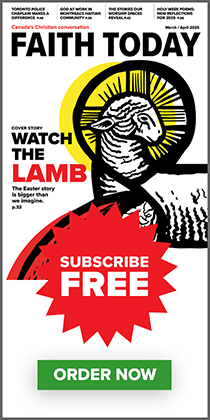Columnist David Guretzki reflects on some things we know to be true.

→en français
Few could have predicted the level of political unrest we’ve seen so far in 2025. This includes the resignation of a prime minister, the election of a new one, ongoing threats of tariffs and counter-tariffs, and all the drama of a federal election (the outcome of which, as I write this, remains unknown).
In such times of geopolitical upheaval, the Church has often stepped in to offer theologically responsible statements. This is part of the work the Church and its theological leaders are called to do. The Church must proclaim the Good News of the Kingdom of God, which sometimes means speaking prophetically to society.
In recent months some have urged faith leaders to comment on issues like tariffs or the threatened annexation of Canada. At the EFC we aim to respond when we believe we have the expertise, experience and theological consensus with our evangelical affiliates.
But we also know our limits. Unless the fundamentals of the gospel are publicly threatened, religious freedom is eroded or the sanctity of human life is undercut, we are unlikely to issue a statement. Even then, we require clear scriptural grounding and accountability through affiliate feedback.
This doesn’t mean we must be silent. Throughout history the Church has at times come together, often across denominational lines, to speak out in the face of serious threats to the gospel. One of the most notable examples is the Barmen Declaration of 1934, when German church leaders, calling themselves the Confessing Church, publicly resisted the political and ecclesiastical overreach of the Nazi regime.
Will we be the kind of people animated by love in our political action and discourse?
The Barmen Declaration’s structure is instructive. After a preamble it presents a text from Scripture, an affirmation and a denial. Strikingly it never mentions Hitler or National Socialism. Instead it lays out enduring theological principles – truths that must always be affirmed or falsehoods that need to be denied – regardless of the political moment. In other words, when reading Barmen everyone knew what it was talking about without naming it directly – an important theological and rhetorical strategy we might emulate more often.
It would be inappropriate for me to issue a confession as an individual leader, even with the EFC’s many denominational partners. Still, I offer a few “confessional” reflections after our recent election – reflections I hope will characterize the Christian community long after this election.
1. We affirm that we have only one God and one Lord.
Paul writes, “There is but one God, the Father, from whom all things came” and “one Lord, Jesus Christ, through whom all things came” (1 Corinthians 8:6). The earliest Christian confession that “Jesus is Lord” (Romans 10:9) was, in its context, a direct contradiction to the Roman claim that “Caesar is Lord.” It’s no surprise this confession led to persecution and martyrdom.
Today, we need to remember this truth, especially when political leaders or parties seem to overreach. As Christians we must be cautious not to speak of political figures as if they were little messiahs, even if we’d never call them that outright.
2. We affirm that political leaders are servants under God’s providential rule.
The lordship of Jesus doesn’t negate the place of government. Scripture reminds us that rulers, while fallen and flawed, have a God-ordained role (Daniel 2:21; Romans 13:1). They are “servants” of God (Romans 13:4). In a democracy they are also servants of the people who elect them. They are accountable to both.
3. We affirm that we owe our leaders respect and our prayers.
Scripture calls us to respect and pay taxes to authorities (Romans 13:7; 1 Peter 2:17), but also to pray for them. Paul urges prayer “for kings and all those in authority,” regardless of whether we agree with them (1 Timothy 2:1–2). This is a mark of discipleship – Can we love and pray for those we may even see as opponents of Christ?
My postelection prayer for the Church in Canada is that we will keep reminding one another that our primary allegiance is to Jesus Christ and that our true citizenship is in heaven. Yet we are also called, here and now, to love God and neighbour – including our political neighbours and leaders.
Love may require prophetic speech and sometimes civil disobedience when political demands contradict God’s Word. But far too often we default to complaint, contempt or unrealistic elevation of political figures. And, worse, we are tempted to be driven by fear.
Love does not live in or by fear (1 John 4:18). Will we be the kind of people animated by love in our political action and discourse, and not by hatred, disdain or fear?
David Guretzki is the EFC’s president and CEO. Read more of these columns at FaithToday.ca/CrossConnections. Photo-Illustration: Janice Van Eck; Sources: Hamid Siddiqui; Ava Bitter